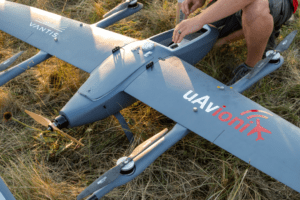 As FAA representatives at Commercial UAV Expo speak about the agency’s plans to speed and streamline the permissions process, two new exemptions for commercial drone operations beyond visual line of sight (BVLOS) have been announced. uAvionix has received authorization to fly their Rapace within North Dakota’s Vantis network to test detect and avoid technologies. UPS Flight Forward, a wholly owned subsidiary of logistics company UPS, has received authorization for BVLOS small package delivery using the type-certified Matternet M2.
As FAA representatives at Commercial UAV Expo speak about the agency’s plans to speed and streamline the permissions process, two new exemptions for commercial drone operations beyond visual line of sight (BVLOS) have been announced. uAvionix has received authorization to fly their Rapace within North Dakota’s Vantis network to test detect and avoid technologies. UPS Flight Forward, a wholly owned subsidiary of logistics company UPS, has received authorization for BVLOS small package delivery using the type-certified Matternet M2.
The authorizations follow quickly upon the August 24 authorization of Phoenix Unmanned to operate a large UAS for linear infrastructure inspection.
As FAA Head of Aviation Safety, David Boulter indicated in his Commercial UAV Keynote address this morning, the new approvals could serve as templates to smooth the way for future companies, and as a means of gathering more data on BVLOS operations.
In a press release, uAvionix explained why the approval is different than another waiver:
A waiver is essentially a one-off with every waiver theoretically receiving the same amount of rigor and safety analysis (as they should). Approval under an exemption provides for repeatability – an exemption (which is technically rulemaking) can be referenced for future approvals in a much faster manner. More importantly it doesn’t just apply to the original applicant; it works for the whole industry! With this exemption approval, the way is clear(er) for BVLOS operations, especially in North Dakota, where the infrastructure can be leveraged for repeatable operations. The same, or similar infrastructure can be used in other geographies. Yes, there is still a process, but the steps are proven, repeatable, and result in demonstrably safe operations.
The Association for Uncrewed Vehicle Systems International (AUVSI) also commended the FAA action, with the following statement from Chief Advocacy Officer Michael Robbins:
“These approvals mark an important step in the development of commercial drone delivery operations at scale in the national airspace system – one that, over time, will expand to benefit many communities nationwide. The exemptions will increase access to rural areas, improve the quick transport of goods, and support the use of drones for critical infrastructure inspections.
AUVSI applauds the FAA for its timely finalization of templates that will streamline certain commercial drone operations, which will further the agency’s progress toward its vision of a future where all users of the airspace can operate together under the highest safety standards.
As the agency moves toward a final BVLOS rulemaking, AUVSI urges the FAA to consider the holistic safety picture and success these companies will demonstrate. AUVSI remains committed to working with the FAA and Congress to support U.S. advanced aviation leadership and realize the immense benefits this industry stands ready to provide.”

Miriam McNabb is the Editor-in-Chief of DRONELIFE and CEO of JobForDrones, a professional drone services marketplace, and a fascinated observer of the emerging drone industry and the regulatory environment for drones. Miriam has penned over 3,000 articles focused on the commercial drone space and is an international speaker and recognized figure in the industry. Miriam has a degree from the University of Chicago and over 20 years of experience in high tech sales and marketing for new technologies.
For drone industry consulting or writing, Email Miriam.
TWITTER:@spaldingbarker
Subscribe to DroneLife here.







[…] may not be implemented until 2025, programs like Wing’s – and the operations enabled by recent FAA authorizations for UPS Flight Forward and Zipline – have become more important to making commercial drone delivery viable. As the […]